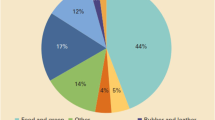Abstract
We currently live in a world where depletion of resources is beyond control. The call for sustainable development both environmentally and economically is spelt out loud and clear. Hence, the current and future generations must ensure that all resources shall be preserved, fully utilized and well managed. Waste generation has been part and parcel of mankind’s pursuit for development, be it in social or economic activities. Municipal Solid Waste (MSW) is an example of socio-economic activities that entails with waste generation. Generation rates of MSW vary according to the economic and social standing of a country. This in return will also affect the management style of the MSW generated. Generally, the higher income countries generated more waste, recycle more and have the money to employ new technology to treat their waste. As for the lower income countries, the waste generated is more organic in nature, which calls for lesser recycling, whereas disposal is by open dumping. The effects of this naturally would mean that in the lower income countries pollution to the water and air is huge as compare to the more developed countries. However on the other hand, does waste alone generate harmful gasses that pollute the world or does manufacturing, transportation and power production, which is rampant in the more industrialized countries contributing more towards pollution? This subject is argumentative and could be discussed at length. However, the environment cannot wait for the population to debate on the above matter. Action needs to be taken in a world where economic power determines the treatment method. Hence, the idea of recovering all ‘wealth’ in the waste is essential to ensure that even the poorest countries could benefit from all waste management technologies. For this to work, recycling, reuse and recovery of energy is essential in an integrated approach towards waste management. This would also mean that many environmental disasters could be avoided. However, an even more pertinent matter to be advocated is that do we need to generate so much waste or are we generating too much waste? Many technology managers are working towards ‘Zero Waste’ these days but how far away is it?






Similar content being viewed by others
References
Ali Khan MZ, Burney FA (1989) Forecasting solid waste composition—an important consideration in resource recovery and recycling. Resour Conserv Recycl.3:1–17
Cointreau S (2006) Occupational and environmental health issues of solid waste management: special emphasis on middle and lower-income countries. Report to the Waste Management Unit of the World Health Organization, Regional Office in Europe
World Resources Institute, International Energy Agency (2005a) Earth trends data tables: climate and atmosphere. World Resources Institute, International Energy Agency, United Nations Framework
World Resources Institute, International Energy Agency (2005b) Earth trends data tables: energy consumption by source. World Resources Institute, International Energy Agency, United Nations Framework
World Resources Institute, International Energy Agency (2005c) Earth trends data tables: energy production by source. World Resources Institute, International Energy Agency, United Nations Framework
World Resources Institute, International Energy Agency (2005d) Earth trends data tables: greenhouse gas emissions by source. World Resources Institute, International Energy Agency, United Nations Framework
World Resources Institute, International Energy Agency (2005e) Earth trends data tables: energy. World Resources Institute, International Energy Agency, United Nations Framework
Kathiravale S et al (2002) A Material Balance of the Municipal Solid Waste Generated by the Various Sources in Kuala Lumpur. World Engineering Congress 2002, Kuching Sarawak, July 22–25, 2002
Manser AGR, Keeling AA (1996) Processing and recycling municipal waste. CRC, Boca Raton, FL
Muhd Yunus MN (2004) Developing strategies for MSW management R&D in Malaysia and the repositioning of the thermal treatment discipline, 3rd I-CIPEC, Hongzhou, China, October, 2004
Municipal Solid Waste and its Role in Sustainability (2003). A position paper prepared by IEA Bioenergy. http://www.ieabioenergy.com
Nasir Hassan M, Kathiravale S et al (2002) Municipal solid waste characterisation study of Kuala Lumpur, Malaysia. International Solid Waste Association World Environment Congress and Exhibition 2002, Istanbul Convention and Exhibition Center, Turkey, July 8–12. 2002
Author information
Authors and Affiliations
Corresponding author
Rights and permissions
About this article
Cite this article
Kathiravale, S., Muhd Yunus, M.N. Waste to wealth. Asia Europe J 6, 359–371 (2008). https://doi.org/10.1007/s10308-008-0179-x
Published:
Issue Date:
DOI: https://doi.org/10.1007/s10308-008-0179-x




